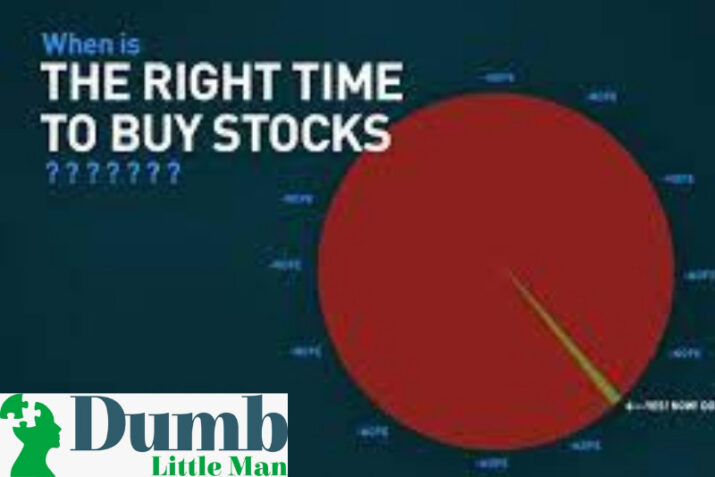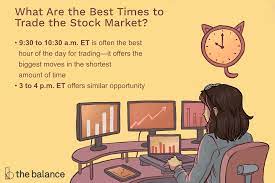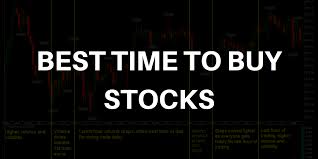Best Time To Buy Stocks [2025]
By J Maver
January 5, 2025 • Fact checked by Dumb Little Man

Do there exist any regulations about when one should purchase or sell stocks? That is a popular question among those wanting to trade. The best time to buy or sell a stock mostly depends on individual market analysis and company research.
The first and last hours of the day, when they have the most trading volume and volatility, also generally have more trading activity than the middle of the day. A veteran stock trader could profit by capitalizing on the increased volatility to move into the market and take advantage of a pattern of price behavior in order to get in and out of a stock.

Some traders claim that there are certain days of the week and certain months that are more favorable for trading in one direction over the other, but whether or not this holds true over time is unconfirmed as long as these market timing patterns remain public knowledge. Many traders still think there are certain days when trading stocks is more profitable.
| RECOMMENDED TRADING COURSE | REVIEW | VISIT |
|---|---|---|
 | #1 Forex, Crypto and Stocks trading course. Ranked most comprehensive by Investopedia and Best by Benzinga. Free to Try! |  |
Stock Market Hours
Stock markets in the United States, which include the New York Stock Exchange (NYSE) and NASDAQ, have specific operating hours. These are the standard U.S. stock market hours for NYSE and NASDAQ traded stocks:
Prior to opening, trading starts at 4 a.m. EST, though the pre-market is usually open at 8 a.m.
The open and close times of the regular market are from 9:30 a.m. to 4 p.m. EST. These are the ideal trading hours.
Once the trading day is over, the after-market (when investors can trade between 4 p.m. and 8 p.m. EST) begins.
Market moves often do not follow rules
Over time, you may find exceptions to the general guidelines, when you observe the stock market. Because prices fluctuate due to multiple factors, as well as the influences of other stock prices, the changes in stock prices occur frequently. Events and other random elements frequently produce price changes, many of which appear quickly and without prior warning. For this trade, the first and final periods may be considered the trade’s active hour. When there are opportunities for traders, they could benefit in between those opportunities by making some money each day.
Best Time To Buy Stocks [2025]
After hearing from experts in the field, it was discovered that getting involved with stocks right after the open is ideal when the morning news is generally positive. The first two hours of the day after the opening on the NYSE should see the biggest increases in the market. The selling-based market increases the most in the first two hours of the trading day after the opening. This happens from 9:30 a.m. to 11:30 a.m. EST.
![Best Time To Buy Stocks [2021]](https://www.dumblittleman.com/wp-content/uploads/2021/09/image-2-13.jpg)
The thinking behind this idea is that if the market has not discounted new information about a stock’s performance before the stock rises in price, the best time to sell the stock is immediately after the market opens. However, if the rally does not occur, the trader may exit the position later in the trading session with a small loss or without a loss altogether.
This is true in some situations, but not in all, as there are numerous influences that can lead to stock opening gaps, ranging from events such as an announcement that influences an individual stock or the market in general. Anyone knowledgeable about this gap should be aware of its existence and wary of engaging in any further open market trading until they fully understand the dynamics at play.
Best time of day to trade stocks
A lot of investors take a long-term view of things and work on trading strategies, but professional day traders tend to focus on their short-term goals. In a stock market trading scenario, the trader buys stock not to keep and watch it rise gradually, but instead to quickly turn around within a short timeframe whether that is on a few occasions, a week, month, or quarter.
You would think that day trading has a relatively short time frame, given its name. Time of day plays a role in some trades, and exact measurements can be used to show the length of trade.
Best day to buy stock
Some people think that there are certain days that produce more substantial results than others, but after significant investigation, this type of effect is difficult to identify on a wide scale.
Despite that, most people still believe that Monday afternoon is the best time of the week to begin work and sell stock. Monday Effect is the term used to describe it.
Fridays that precede three-day weekend tend to be even better in the United States. Financial markets start to grow ahead of observed holidays because every portfolio manager has a general sense of optimism.
Best Day of the Week to Sell Stocks
Most likely, at 3:00 p.m. EST, the end of the U.S. trading day in New York City, when everyone on Wall Street seems to be trying to sell stock shares, is when biggest trades happen. Based on the assumption that most stocks have reached their highs and are thus ready to fall before the close, strategy is to liquidate assets immediately.
Most information on any specific stock is usually already released by the close of the trading day. Because the price already accounts for any volatility from the news, there should be no major price fluctuations.
One major consideration in the timing of sales is that many daily traders don’t stay for late day rally, so any selling should happen just before the close of the trading day. Day traders could use the market close to selling stock they had previously bought after it did well during the session.
If you believe you can guess when more experienced traders will sell and when, you can try to get ahead of them by shorting the stock and closing out your position before the last hour, profiting off the stock’s common descent.
Best Day of the Month to Buy Stock
Every month has at least one day when the market is both strong and weak. Stocks tend to increase at the end of a month, although this can be interrupted. Money that flows into mutual funds every month is usually guided by this habit.
Fund managers are also trying to help themselves out by making their accounting records look higher at the end of each quarter by buying up stocks that have performed well that quarter. In the middle of the month, it’s fairly typical for stock rates to fall.
Around the middle of the month, stock prices tend to drop. One advantage traders might have is to time stock purchases in the middle of a month. For example, a trader may buy stock in the middle of every month. It is a good idea to sell stocks near the end of the month.
Best Month to Buy Stocks
The best times to invest in the stock market are near the beginning of the year, as well as in the summer. It’s a known fact that September is traditionally a slow month. On average, October returns have been positive even though there have been big drops of 19.7 percent and 21.5 percent in 1929 and 1987, respectively.
In September, a trader could consider loading up on equities in preparation for the general rise in price in October.
And a pattern is known as the January Effect. A return to trading with vigor in the New Year makes small-cap and value stock rates particularly volatile.
Each decade, the best month to buy shares had been in April. Obviously, you need to think about what you buy. If you buy an S&P 500 index exchange-traded fund or a comparable product, it’s likely that this tendency will be reflected, as long as the trend itself doesn’t alter. If you buy individual stocks, then you won’t find many links between market index analysis and the stock you select.
Seasonal Effect in Stock Trading
The seasonal effect exists, and they’re somewhat predictable. This is likely the result of numerous things: general retail trade, commodities crops harvested in the summer, and increasing shopping time in the run-up to Christmas.
The stock markets tend to crash, the market order is disrupted and there comes a financial crisis. In the wake of the crash, many seasoned traders and many investors decide to withdraw from the markets and limit their stock investments. You should know about this effect along with investment strategies if you are planning to begin trading and stock investing and don’t want to lose money.
At the end of the day, the fiscal and monetary policy put in place by the government, as well as the health of the economy, are going to play the most significant roles.
Market Volatility
When a stock’s price plummet, volatility is revealed. Low volatility is defined by the presence of price consistency in the stock market. The Volatility is both volatile and jumpy, bouncing between low and high points. In order to see if the risk is worth it, an investor must make that decision. You could end up with a big loss if you need to trade your current stocks. In this way, measuring volatility is a great way to gauge how much economic burden a given investment presents. Then, future investments should be guided by the amount investors choose to invest.
In the morning, when volatility and volume tend to slow, most traders stop trading. Trades take longer, and volume is lower. Day trading index futures like the E-mini S& P 500 (ES) or an index-based ETF like the SPDR S& P 500 (SPY) can start as early as 8 a.m. and end about 10:30 a.m. That’s two hours of trading with a lot of profit possibilities.
The end-of-day trading sessions can lead to significant swings in price and more trading volume. In order to ensure successful trading for beginners, remember to close all of your open positions at 3 p.m.
| RECOMMENDED TRADING COURSE | REVIEW | VISIT |
|---|---|---|
 | #1 Forex, Crypto and Stocks trading course. Ranked most comprehensive by Investopedia and Best by Benzinga. Free to Try! |  |
Choose Asia Forex Mentor for Your Forex and Stocks Trading Success
If you have a keen interest in establishing a successful career in forex trading and aspire to achieve substantial financial gains, Asia Forex Mentor stands as the optimal choice for the best forex, stock, and crypto trading course. Ezekiel Chew, renowned as the visionary behind trading institutions and banks, is the driving force behind Asia Forex Mentor. On a personal note, Ezekiel consistently achieves seven-figure trades, a distinction that truly sets him apart from other educators in the field. Here are the compelling reasons that underpin our recommendation:
Comprehensive Curriculum: Asia Forex Mentor offers an all-encompassing educational program that covers stock, crypto, and forex trading. This well-structured curriculum equips aspiring traders with the knowledge and skills necessary to excel in these diverse markets.
Proven Track Record: The credibility of Asia Forex Mentor is firmly established through its impressive track record of producing consistently profitable traders across various market sectors. This achievement serves as a testament to the effectiveness of their training methodologies and mentorship.
Expert Mentors: At Asia Forex Mentor, students benefit from the guidance and insights of experienced mentors who have demonstrated remarkable success in stock, crypto, and forex trading. These mentors provide personalized support, enabling students to navigate the intricacies of each market with confidence.
Supportive Community: Joining Asia Forex Mentor brings access to a supportive community of like-minded traders pursuing success in the stock, crypto, and forex markets. This community fosters collaboration, idea-sharing, and peer learning, enhancing the overall learning experience.
Emphasis on Discipline and Psychology: Success in trading necessitates a strong mindset and disciplined approach. Asia Forex Mentor provides crucial psychological training to help traders manage emotions, handle stress, and make rational decisions during trading.
Constant Updates and Resources: The financial markets are dynamic, and Asia Forex Mentor ensures that students remain up-to-date with the latest trends, strategies, and market insights. Continuous access to valuable resources keeps traders ahead of the curve.
Success Stories: Asia Forex Mentor takes pride in a multitude of success stories where students have transformed their trading careers and achieved financial independence through their comprehensive forex, stock, and crypto trading education.
In summary, Asia Forex Mentor emerges as the premier choice for those seeking the best forex, stock, and crypto trading course to carve a rewarding career and achieve financial prosperity. Through its comprehensive curriculum, experienced mentors, practical approach, and supportive community, Asia Forex Mentor provides the necessary tools and guidance to mold aspiring traders into accomplished professionals across diverse financial markets.
RECOMMENDED TRADING COURSE | REVIEW | VISIT |
#1 Forex, Crypto and Stocks trading course. Ranked most comprehensive by Investopedia and Best by Benzinga. Free to Try! |
Conclusion
Obviously, there are no hard and fast rules for when to trade stocks; instead, these guidelines are only general rules to follow. It all depends on the market and recent events because exceptions and anomalies appear constantly.

A few general guidelines apply to day trading, such as the very first hour of the trading day, which tends to be the most active. Many traders, however, are able to successfully trade outside of those hours in the last hour.
However, data analysis suggests that any market timing patterns that generate abnormally high returns are largely disappeared in a short time, as such opportunities are typically quickly discovered and then arbitraged away, making markets more efficient by allowing traders and investors to learn and exploit patterns.
F.A.Q.
What time does after-hours stock trading close?
In the market’s regular session, the first and last hour is 9:30 a.m. to 4:00 p.m. ET. These are the pre-market hours. The market open time is late, operating between 4:00 p.m. and 8:00 p.m. ET.
Should you buy stocks in the morning or evening?
The best time of day for day trading is the specific hours between 9:30 a.m. and 10:30 a.m. EST. The big price moves take place during that one hour period. Many professional day traders begin tapering at 11:30 in the morning due to an expectation that volatility and volume will begin to slow at that time.
Is it better to buy Stocks at open or close?
The post-open time is ideal for smaller firms and new traders to enter the market to place trades and gain some investing experience. Traders are now in a position to trade more shares, as all transfers are quoting prices at this point. If a day trader wishes to take a quick day trade, he should purchase the shares he wants to exit at the close of the day and get himself involved in short selling and buying.
Is it good to buy night?
New research demonstrates that nearly all gains made in the stock market take place overnight, or over the span of a few hours. Other studies indicate that this phenomenon occurs most prominently in stocks with higher volatility.
J Maver
Passionate in tech, software and gadgets. I enjoy reviewing and comparing products & services, uncovering new trends and digging up little known products that deserve an audience.













